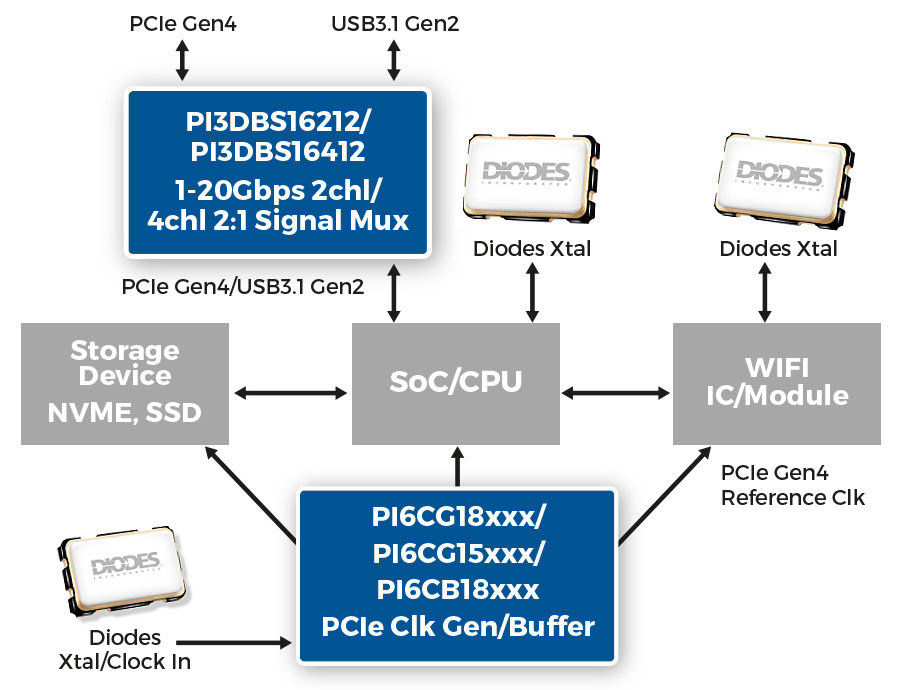By Brian Santo, contributing writer
PCIe 4.0 version 1.0 was finally released late last year. More and more products that conform to the spec are hitting the market, including a recent set of signal switches, clock generators, and clock buffers from Diodes Inc. that support the significantly faster operation of PCIe 4.0 buses.

This latest iteration of the Peripheral Component Interconnect Express (PCIe) bus standard has a number of advances. But by far the most pertinent improvement is the doubling of data rates compared to the preceding 3.0 revision (introduced in 2010) — from 8 gigatransfers per second (GT/s) to 16 GT/s.
Revision 4.0 was originally due in 2015, but it took PCI-SIG (which manages the PCI standards) seven years to go from revision 3.0 to revision 4.0. There are other buses, but the delay of PCIe 4.0 appears to have encouraged the creation of yet one more standard, known as CCIX. PCI-SIG, apparently in response to CCIX, now plans to introduce PCIe 5.0 in less than 2 years — in 2019. Version 5.0 will double the transfer rate of PCIe yet again to 32 GT/s.
PCIe 4.0 will be immediately useful for a variety of applications that thrive on speed, including gaming, high-performance computing (HPC), and 10-Gigabit Ethernet connectors. PHYs, controllers, and FPGAs for PCIe 4.0 applications have been announced by PCI-SIG members such as Cadence, Synopsys, IBM, and Intel.
Most recently, Diodes Inc. announced its line of PCIe 4.0-compliant signal switches, clock generators, and clock buffers, which addresses “the expanding market for signal routing with different protocols in PCs, servers, embedded applications including artificial intelligence, and fast data transfer generally,” said the company.
The PI3DBS16212 and PI3DBS16412 are 1- to 20-Gbits/s two-channel and four-channel 2:1 differential multiplexers/demultiplexers. The company said that they are both characterized by extremely low loss, reflection, crosstalk, and skew. Typical applications include switching high-speed serial signals employing a variety of newer protocols. Specifically for PCIe 4.0 applications, the two muxes offer what the company warrants as excellent signal integrity with an insertion loss of just −1.3 dB at 16 Gbits/s. In this application, said Diodes, minimal skew between channels eases the timing budget between nodes, and power dissipation is very low (typically 300 µA).
The company also has four clock generators aimed at various PCIe 4.0 applications. They are the PI6CG18201, PI6CG18401, PI6CG18801, and PI6CG15401. Based on the company’s own phase-locked loop (PLL) design, they provide 1.8-V 2/4/8 HCSL outputs and 1.5-V 4 HCSL outputs, respectively. All have jitter performance of less than 0.5 ps. They can provide the reference clock for SERDES chipsets supporting the PCIe 4.0 interface. Each output has its own enable with programmable slew rate and amplitude.
Diodes also announced four clock buffers: the PI6CB18200, PI6CB18401, PI6CB18601, and PI6CB18801. The PCIe 4.0 2/4/6/8 HCSL output clock buffers are fanned out from a reference input, said the company, adding that, like the clock generators, the slew rate and amplitude of each output is programmable and there are individual output enables for better power management. Additive jitter for the clock buffers is less than 0.05 ps.
Prices for the PI3DBS16212 and PI3DBS16412 signal switches range from $0.68 to $1.32. Prices for the PI6CG18201, PI6CG18401, PI6CG18801, and PI6CG15401 PCIe 4.0 clock generators and PI6CB18200, PI6CB18401, PI6CB18601, and PI6CB18801 PCIe 4.0 clock buffers range from $1.45 to $2.24 each in quantities of 5,000.
Advertisement
Learn more about Electronic Products Magazine





